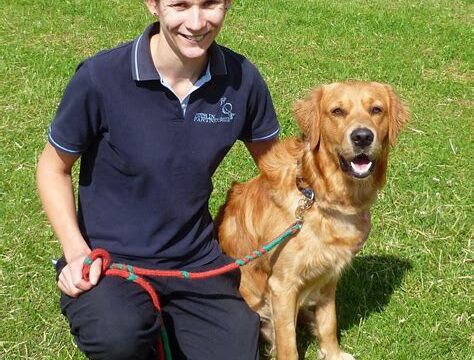Become a certified dog trainer by gaining experience, taking courses, and building clientele. Learn how to market and develop training techniques. Start your dog training career today!
Research Dog Training Career
When considering a career as a dog trainer, it is important to thoroughly research the industry and understand the various aspects of the profession. This includes gaining knowledge about the different types of dog training methods, understanding the psychology of dogs, and familiarizing oneself with the various tools and equipment used in training. Additionally, research should be conducted on the potential demand for dog trainers in your area, as well as the average income and career opportunities available within the industry.
Furthermore, it is important to research the various educational and certification programs available for aspiring dog trainers. This may include attending workshops, seminars, and conferences related to dog training, as well as obtaining certifications from reputable organizations such as the Certification Council for Professional Dog Trainers (CCPDT) or the International Association of Canine Professionals (IACP).
Finally, it is essential for aspiring dog trainers to research the different career paths and specializations within the industry. This may include working with service dogs, training dogs for obedience competitions, or specializing in behavior modification. By conducting thorough research, aspiring dog trainers can gain a better understanding of the career opportunities available to them and make informed decisions about their future in the profession.
Gain Experience with Dogs
One of the first important steps in becoming a dog trainer is gaining experience with dogs. This can be achieved by volunteering at animal shelters or dog rescues, where you can interact with a variety of canine personalities and learn about different breeds. Spending time with dogs in different environments will help you develop a better understanding of their behavior and needs.
Another way to gain experience is by offering to dog sit for friends and family members. This will give you the opportunity to practice your training skills and build a reputation as a reliable and competent dog caregiver. Additionally, consider reaching out to local dog trainers and offering to assist them during training sessions or classes. This hands-on experience will provide valuable insights and allow you to learn from seasoned professionals in the field.
Seeking out opportunities to work with a variety of dogs will help you become more versatile and adaptable as a trainer. Each dog has its own unique personality and learning style, and the more experience you have with different canines, the better equipped you will be to meet the diverse needs of your future clients.
Take Dog Training Courses
When trying to break into the field of dog training, it’s essential to take dog training courses to gain the necessary knowledge and skills. These courses provide a solid foundation in understanding dog behavior, learning theories, and training techniques. Additionally, they offer hands-on experience working with different dog breeds, which is invaluable for a future career as a dog trainer.
Enrolling in dog training courses also allows individuals to learn from experienced professionals in the field. Instructors can provide valuable insights, mentorship, and guidance, helping aspiring dog trainers develop their own effective training methods. It’s an opportunity to ask questions, seek advice, and gain a deeper understanding of the nuances of dog behavior and training.
Furthermore, completing dog training courses can also lead to certification, which can boost credibility and demonstrate a commitment to professional development. Many clients seeking the services of a dog trainer prefer to work with someone who has undergone formal training and education in the field. Thus, taking dog training courses not only enhances skills but also enhances one’s marketability as a professional dog trainer.
Obtain Certification
Obtaining certification as a dog trainer is an important step in launching your career in this field. It not only demonstrates your expertise and knowledge in dog training, but it also gives you credibility and trustworthiness as a professional. Many potential clients look for certified trainers when seeking help for their furry companions, so obtaining certification can significantly increase your chances of building a successful career in dog training.
There are various organizations and associations that offer certification programs for dog trainers. Some popular options include the Certification Council for Professional Dog Trainers (CCPDT), the International Association of Canine Professionals (IACP), and the National Association of Dog Obedience Instructors (NADOI). Each organization has its own set of requirements and examination processes, so it’s important to research and choose the certification program that aligns with your career goals and values.
Once you have completed the necessary coursework and training, you can then sit for the certification exam. This typically includes both written and practical components to evaluate your theoretical knowledge and practical skills in dog training. Upon successful completion of the exam, you will be awarded with a certification and can use the designated letters after your name to signify your professional credentials as a certified dog trainer.
Develop Training Techniques
When it comes to becoming a successful dog trainer, developing effective training techniques is crucial. Whether you are working with puppies or adult dogs, it’s important to have a variety of methods at your disposal in order to meet the needs of different pets and their owners. One technique that you can use is positive reinforcement, which involves rewarding good behavior with treats or praise. This encourages the dog to repeat the desired behavior, making it an effective way to teach new commands or manners. Another important technique is using clear and consistent communication, as dogs respond well to a calm and confident tone of voice. This can help to establish your authority as the trainer and make it easier for the dog to understand what is expected of them.
Additionally, developing training techniques also involves understanding the different learning styles of dogs. Some dogs may respond well to visual cues, while others may be more motivated by sound or touch. By tailoring your methods to suit the individual dog, you can ensure that your training is more effective and enjoyable for both the pet and their owner. It’s also important to be patient and understanding, as every dog is unique and may require different approaches to learning.
As you continue to develop your training techniques, it’s important to stay updated on the latest training methods and theories. This may involve attending workshops, seminars, or even pursuing further education in the field of dog training. By continuously learning and refining your skills, you can become a more confident and successful dog trainer, helping to build a positive reputation for yourself and your business.
Build Clientele through Networking
Building a successful dog training business involves more than just learning how to train dogs. Once you have gained experience and obtained certification, the next step is to build a strong client base. Networking is a crucial aspect of growing your clientele and establishing your reputation as a reliable and knowledgeable dog trainer.
One way to network and build clientele is to attend local dog events and seminars. These events provide an opportunity to meet dog owners and other professionals in the industry. You can also consider joining professional organizations and associations related to dog training, as these provide valuable networking opportunities and can help establish your credibility in the field.
Another effective way to build clientele through networking is to collaborate with other pet professionals, such as veterinarians, pet sitters, and groomers. Establishing strong relationships with these professionals can lead to referrals and partnerships, ultimately helping you expand your client base. Additionally, utilizing social media and online platforms to engage with potential clients and showcase your expertise can help attract new clients and build a loyal following.
Market Your Dog Training Business
Once you have obtained the necessary certification and developed your unique training techniques, it’s time to focus on marketing your dog training business. Building a strong clientele is crucial for the success of your business, and one of the best ways to do this is through networking.
Start by attending local dog events and connecting with pet owners who may be interested in your services. You can also reach out to local pet stores and veterinarian offices to see if you can leave business cards or flyers at their establishments. This will help you get your name out in the community and attract potential clients.
Furthermore, in today’s digital age, having a strong online presence is crucial for any business. Create a professional website that showcases your services and testimonials from satisfied clients. You can also utilize social media platforms such as Facebook and Instagram to engage with potential customers and share valuable training tips and success stories to attract new clients.
Frequently Asked Questions
What qualifications do I need to become a dog trainer?
While formal qualifications are not mandatory, obtaining a certification from a reputable dog training organization can enhance your credibility and skillset.
How can I gain experience as a dog trainer?
You can gain experience by volunteering at animal shelters, interning with experienced dog trainers, or offering your services to friends and family for free or at a discounted rate.
Is there a demand for dog trainers?
Yes, there is a growing demand for dog trainers, especially those who can work with problem behaviors, obedience training, and service dog training.
What are the key skills needed to become a successful dog trainer?
Patience, communication skills, empathy, and a deep understanding of canine behavior are crucial for success as a dog trainer.
What are the potential career paths for a certified dog trainer?
Certified dog trainers can work independently, join an established dog training facility, work with veterinarian clinics, or even specialize in specific areas like therapy dog training or agility training.
How much can I expect to earn as a dog trainer?
Earnings can vary based on location, experience, and specialization, but the average annual salary for a dog trainer is around $35,000 to $45,000.
Are there any additional resources or tools that can help me in my dog training career?
Yes, staying updated on the latest training techniques, attending workshops, and building a network within the dog training community can greatly benefit your career.





